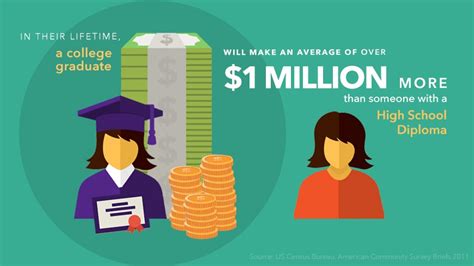In today’s rapidly evolving job market, a college education has become increasingly important for individuals seeking to secure a successful career and lead a fulfilling life. While the decision to pursue higher education can be life-changing, it’s essential to carefully consider the potential benefits and drawbacks before making a commitment.

Financial Advantages
One of the primary reasons to consider attending college is the significant financial payoff it offers. According to the U.S. Bureau of Labor Statistics, workers with a bachelor’s degree earn on average 65% more than those with only a high school diploma. This premium applies to all major occupational groups, from healthcare to education to manufacturing.
| Education Level | Median Weekly Earnings |
|---|---|
| High School Diploma | $741 |
| Associate Degree | $917 |
| Bachelor’s Degree | $1,228 |
| Master’s Degree | $1,444 |
| Doctorate | $1,795 |
Career Advancement
College graduates enjoy a competitive advantage in the job market due to the specialized knowledge and skills they acquire. They are more likely to secure high-paying jobs, qualify for promotions, and assume leadership positions. According to a study by Georgetown University’s Center on Education and the Workforce, almost 60% of today’s jobs require at least a bachelor’s degree.
Increased Job Security
In the face of technological advancements and economic fluctuations, college graduates are more resilient to job loss. Their higher earning potential, specialized skills, and career flexibility provide a buffer against economic downturns.
Personal Fulfillment
Beyond the financial and career benefits, a college education also offers opportunities for personal growth and fulfillment. Students engage in critical thinking, problem-solving, and collaboration, developing valuable skills that extend beyond the classroom. College is also a time for exploration, self-discovery, and the formation of lifelong friendships.
Types of Colleges and Degrees
The higher education landscape is vast and complex, with various types of colleges and degrees to choose from. Common options include:
- Community Colleges: Offer affordable associate degrees and technical certificates, providing a foundation for further education or entry into the workforce.
- Four-Year Colleges and Universities: Award bachelor’s, master’s, and doctoral degrees in a wide range of academic disciplines.
- Online Colleges: Provide flexible, remote learning options through online platforms.
- Trade Schools: Specialize in vocational training, offering specific skills for immediate employment in trades such as plumbing, electrical work, or automotive repair.
Common Mistakes to Avoid
When considering college, it’s essential to avoid common pitfalls that can derail your academic journey:
- Not planning ahead: Start planning early to ensure you meet application deadlines, secure financial aid, and choose a program that aligns with your interests and career goals.
- Choosing the wrong college: Research different colleges thoroughly to find one that suits your learning style, campus culture, and financial situation.
- Overestimating your abilities: Be realistic about your academic workload and time commitment. Don’t enroll in too many courses or work too much outside of class, as this can lead to academic struggles.
- Giving up too easily: College can be challenging at times. Don’t be discouraged by setbacks. Seek help from professors, tutors, or academic advisors when needed.
Tips and Tricks for College Success
Maximize your college experience with these proven tips:
- Attend class regularly: In-class engagement is crucial for learning and staying on top of your studies.
- Take good notes: Take notes to retain information, review key concepts, and prepare for exams.
- Study effectively: Develop efficient study methods such as spaced repetition, active recall, and concept mapping.
- Get involved on campus: Join clubs, attend events, and participate in extracurricular activities to enhance your college experience and make new connections.
- Seek help when needed: Don’t hesitate to ask for assistance from professors, tutors, or academic advisors if you’re struggling with a concept or assignment.
Conclusion
The decision to attend college is a significant one with far-reaching consequences. By carefully considering the financial, career, personal, and practical implications outlined in this guide, you can make an informed decision that aligns with your long-term goals. Remember, college is not just about earning a degree; it’s an investment in your future, your career, and your life’s fulfillment.
